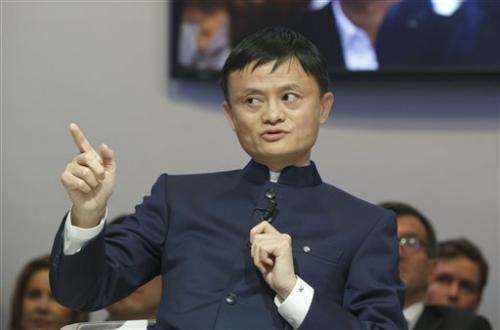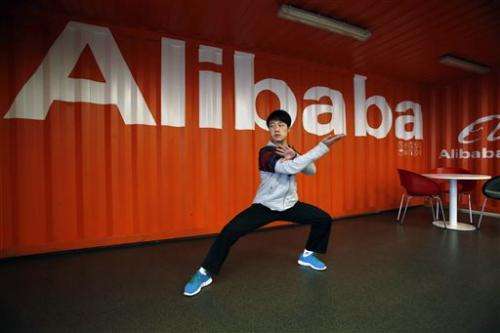Alibaba run-in with China regulator signals tougher scrutiny

For years, Alibaba faced complaints it failed to stamp out sales of counterfeit goods on its e-commerce websites. But Chinese regulators stayed silent, apparently reluctant to disrupt the rise of an Internet star even as they accused foreign automakers, dairies and others of violating anti-monopoly or consumer protection rules.
That honeymoon ended this week. In a stinging report, a Cabinet agency accused Alibaba Group Ltd. of allowing sales of fake goods and hurting consumers. It was a warning that Alibaba and other private Chinese companies face tougher scrutiny at a time when they are moving into new markets from retailing to banking to taxi hailing.
Given the company's expanding role in China's state-dominated economy, "It's not a surprise that Alibaba finds itself under the spotlight in much the same way that many foreign firms have," said analyst Ben Cavender of the China Market Research Group in Shanghai.
Alibaba's high profile as one of China's biggest private companies brought widespread attention to its run-in with the State Administration of Industry and Commerce. But a series of companies have come under pressure as Beijing tones down its longtime strategy of growth at all costs and shifts to emphasizing protection for workers, consumers and the environment.
Foreign automakers and milk suppliers were hit with fines in 2013 and last year after regulators said they violated anti-monopoly rules. State TV accused Apple Inc. of treating customers unfairly.
Communist authorities are eager to develop the Internet industry as a source of economic growth and jobs while retaining control over the privately owned companies that dominate it.
Alibaba and others including search engine Baidu Inc. and Tencent Holdings Ltd., which operates the popular WeChat social media service, are launching services in personal finance, entertainment and other fields. Alibaba and Tencent have been picked by Beijing to be among the investors in China's first privately financed banks since the 1949 Communist revolution.
That will expand their presence in the world's second-biggest economy and add to the range of agencies charged with regulating them.

Wednesday's report made no mention of possible penalties. But it accused Alibaba, based in Hangzhou, southwest of Shanghai, of failing to prevent sales of counterfeit goods on Taobao, its consumer-to-consumer platform.
Alibaba's founder, Jack Ma, defended the company on its microblog account. Without mentioning Wednesday's report, he said Alibaba was a victim of counterfeits and was trying to stamp them out.
"Fake products are not caused by Taobao," wrote Ma in the post, dated Wednesday after the report's release. "Society's problem cannot depend on one company, one platform going it alone."
Alibaba, founded in 1999, earned $485 million in the three months that ended in September, its first quarter as a publicly traded company, on revenue of $2.7 billion. It said the total amount of goods sold rose 49 percent and the number of active buyers rose 52 percent to 307 million.
The government's handling of the Alibaba report made clear it still puts a priority on development ahead of enforcement.
It said officials met with Alibaba managers in July but withheld public comment to avoid disrupting progress toward its U.S. stock market debut. Alibaba went public in New York in September after raising a record $25 billion in an initial public offering.
On Thursday, the SAIC report had been removed from the agency's website. Phone calls to the agency were not answered.
"Alibaba did not request the replacement of the white paper nor has Alibaba ever requested SAIC to delay publication of any report," the company said in a statement.
Foreign and private Chinese businesses have long complained regulators give more lenient treatment to state-owned companies or those in politically favored industries. American and European chambers of commerce say anti-monopoly, environmental and labor laws are enforced more rigorously against foreign companies than local rivals.
In China's booming online entertainment market, industry groups say regulators fail to stamp out distribution of unlicensed copies of movies, music and books. Last week, the U.S.-based Motion Picture Association filed a copyright infringement suit against Xunlei, a popular video website.
Other companies have been punished for missteps, but none has suffered the public scolding Alibaba received.
In May, Sina Corp. said it was penalized for allowing "unhealthy and indecent content." Sina was fined $815,000 and stripped of two of its licenses for Internet publication and online transmission of audio-visual programs.
Alibaba took the unusual step of lashing back at Wednesday's report by complaining it was treated unfairly and accusing the SAIC official in charge of Internet monitoring of bias. The company said it planned to file a formal complaint.
© 2015 The Associated Press. All rights reserved.

















